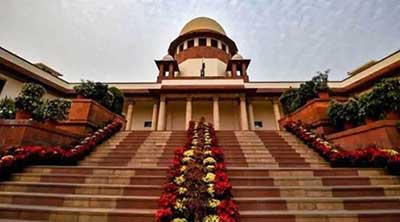Date: 15/11/2022
Relevance: GS-2: Structure, Organization and Functioning of the Judiciary; Powers, Functions and Responsibilities of various Constitutional Bodies; Transparency & Accountability.
Key Phrases: Supreme Court, Accountability, Judicial Independence, Democracy, Article 142 of the Indian Constitution, Law Commission, USA, Jurisdictions, Advisory, RTI, Appointment, Centre-state disputes, Restatement of Values of Judicial Life.
Context:
- In recent times, Judicial accountability and judicial independence are seen as the opposite concept but it is necessary to ensure a balance between them.
Provision of Judicial Accountability:
- The Constitution of India provides for the removal of the judges of the Supreme Court of India (Article 124 of the Indian Constitution) and the High Courts (Article 124) for misbehavior and incapacity by means of impeachment.
- Article 235 of the Constitution provides for the ‘control’ of
the High Court over the subordinate judiciary.
- It provides an effective mechanism to enforce the accountability of the lower judiciary.
- In 1997, the Supreme Court of India adopted a Charter called the
Restatement of Values of Judicial Life.
- The behavior and conduct of members of the higher judiciary must reaffirm the people's faith in the impartiality of the judiciary.
Jurisdictions of the Supreme Court
- Original Jurisdiction
- The Supreme Court, as a federal court, hears cases involving the Indian Federation's various components.
- Writ Jurisdiction
- It has the authority to grant writs such as habeas corpus, mandamus, prohibition, quo-warranto, and certiorari to vindicate an aggrieved citizen's fundamental rights.
- The Supreme Court's writ jurisdiction, however, is not exclusive. The High Courts also have the authority to issue writs to enforce Fundamental Rights.
- Appellate Jurisdiction
- It is largely an appellate court that reviews appeals from lower court decisions.
- Advisory Jurisdiction
- The President may seek the Supreme Court's opinion on two types
of issues under the Constitution (Article 143):
- any question of law or fact of public importance that has arisen or is likely to arise;
- On any pre-constitutional treaty, agreement, covenant, engagement, or other similar instruments that give rise to a dispute.
- The President may seek the Supreme Court's opinion on two types
of issues under the Constitution (Article 143):
Need to Enhance Judicial Accountability:
- Speedy Justice
- Speedy justice is not only our fundamental right but also a prerequisite for maintaining the rule of law and delivering good governance.
- Impartial Functioning
- It will help in ensuring an impartial functioning that would augment public trust in the institution of the judiciary.
- No Legal Obligation
- Unlike the executive, the judiciary is not under any legal obligation to prepare annual reports or table them before Parliament or the State Legislature.
- Guardian of the Constitution
- Judicial accountability is more important, as the derogation of values in the judiciary is far more dangerous than in any other wing of the government as the judiciary has to act as the guardian of our constitution.
- Narrow scope of the RTI
- The scope of information which the courts are willing to share under RTI is not too wide.
- Public Confidence
- The judiciary as an institution needs to preserve its independence, and to do this it must strive to maintain the confidence of the public in the established courts.
- Not under the direct control of SC
- Under our constitutional scheme the high courts are autonomous constitutional bodies not subject to administrative directions of the Supreme Court.
Challenges in enhancing Judicial Accountability:
- When a central government agency interferes in the working of the judiciary, it leads to executive control over the judiciary, which goes against the basic principles of the constitution.
- The use of Article 142 of the Indian constitution has also become a sign of immense judicial indiscipline which gives judges the power to do whatever it takes to secure justice.
Way Forward:
- The Supreme Court should be entrusted with direct responsibility
for the functioning of the high courts.
- Only then can the highest court be an effective apex court, only then can the Supreme Court be made answerable, as it should be, for judicial governance for the entire country.
- Judges of the court must make annual financial disclosure statements,
not privately to their respective chief justices, but publicly as
done by the world’s oldest democracy, the USA.
- Judges must set an example for ministers, central and state, for members of Parliament and of state legislatures, and for all high officials of government, to follow.
- Judicial accountability should be ensured by enacting a law on the lines of the American model.
- Lot of care needs to be exercised so that the anti-corruption measures taken do not undermine the independence of the judiciary
Conclusion:
- Judicial accountability and judicial independence are the two most important aspects with the help of which the tension between two wings of the government i.e. legislature and judiciary can be reduced as these two aspects help to facilitate the smooth functioning of the government and prevent creating a judicial autocracy.
Source: Indian Express
Mains Question:
Q. Maintaining the equilibrium between accountability and independence is necessary for public trust in the judicial system. In the light of the statement suggest the measure for a greater accountable judiciary. (150 Words).







